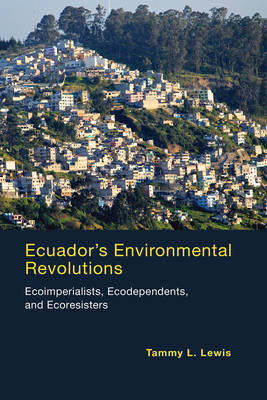
- Afhalen na 1 uur in een winkel met voorraad
- Gratis thuislevering in België vanaf € 30
- Ruim aanbod met 7 miljoen producten
- Afhalen na 1 uur in een winkel met voorraad
- Gratis thuislevering in België vanaf € 30
- Ruim aanbod met 7 miljoen producten
Omschrijving
Ecuador is biologically diverse, petroleum rich, and economically poor. Its extraordinary biodiversity has attracted attention and funding from such transnational environmental organizations as Conservation International, the World Wildlife Fund, and the United States Agency for International Development. In Ecuador itself there are more than 200 environmental groups dedicated to sustainable development, and the country's 2008 constitution grants constitutional rights to nature. The current leftist government is committed both to lifting its people out of poverty and pursuing sustainable development, but petroleum extraction is Ecuador's leading source of revenue. While extraction generates economic growth, which supports the state's social welfare agenda, it also causes environmental destruction. Given these competing concerns, will Ecuador be able to achieve sustainability? In this book, Tammy Lewis examines the movement for sustainable development in Ecuador through four eras: movement origins (1978 to 1987), neoliberal boom (1987 to 2000), neoliberal bust (2000 to 2006), and citizens' revolution (2006 to 2015).
Lewis presents a typology of Ecuador's environmental organizations: ecoimperialists, transnational environmentalists from other countries; ecodependents, national groups that partner with transnational groups; and ecoresisters, home-grown environmentalists who reject the dominant development paradigm. She examines the interplay of transnational funding, the Ecuadorian environmental movement, and the state's environmental and development policies. Along the way, addressing literatures in environmental sociology, social movements, and development studies, she explores what configuration of forces--political, economic, and environmental--is most likely to lead to a sustainable balance between the social system and the ecosystem.
Specificaties
Betrokkenen
- Auteur(s):
- Uitgeverij:
Inhoud
- Aantal bladzijden:
- 292
- Taal:
- Engels
- Reeks:
Eigenschappen
- Productcode (EAN):
- 9780262528771
- Verschijningsdatum:
- 4/03/2016
- Uitvoering:
- Paperback
- Formaat:
- Trade paperback (VS)
- Afmetingen:
- 152 mm x 226 mm
- Gewicht:
- 362 g

Alleen bij Standaard Boekhandel
Beoordelingen
We publiceren alleen reviews die voldoen aan de voorwaarden voor reviews. Bekijk onze voorwaarden voor reviews.











